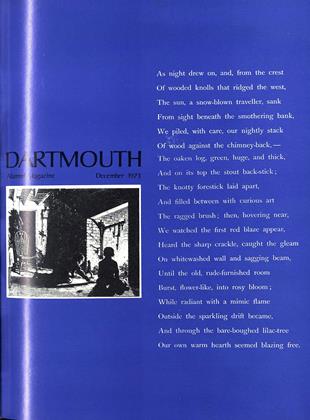In a quiet but impressive way, Dartmouth has fashioned a special tradition of nurturing poets, many of whom have gained national stature in American letters. It is a tradition which shows no sign of waning.
It started when Richard Hovey '85 came out of the Midwestfind at Dartmouth the inspiration for poetry which captured the restless, questing spirit of the College and the nation. As author of "Dartmouth Undying," "Men of Dartmouth" and 'The Hanover Winter Song," Hovey left a legacy of the most lyrical evocations of place ever lavished on any college. Before he died prematurely at age 36 in 1900, he had quickened the pulse of young America with his "Vagabondia" poems and was hailed in both the United States and Europe as a "poet of immeasurable promise."
Although no one has succeeded to Hovey's mantle as poet laureate of the Dartmouth experience, the creative impulse he started at the College has been perpetuated by subsequent generations, with some of Dartmouth's poets numbering among the nation's foremost.
They include the late Robert Frost '96; Alexander Laing '25 now living in Norwich as Professor of Belles Lettres Emeritus the late Dilys Laing, who helped her husband to found the Thursday Poets at Dartmouth; Ramon Guthrie, for 33 years on the faculty as teacher of French literature, whose books Graffiti.Asbestos Phoenix, and Maximum Security Ward established him among the top rank of American poets. (Professor Guthrie died in Hanover on November 22 at the age of 78.) And Richard G. Eberhart '26, Class of 1925 Professor of English Emeritus and retired Poet-in-Residence who holds the Pultizer Prize and many other major national prizes for poetry.
This rich tradition adds a special quality of welcome to the publication of a book of poems by Robert Siegel, assistant professor of English and, like Professors Laing and Eberhart before him, teacher of creative writing courses.
Although the book - titled The Beasts & The Elders from a phrase in Revelations 4:4-10 - is a first for Siegel, his poems have been appearing regularly in magazines and chapbooks across the country, and fellow poets hail his promise.
Robert Lowell, the great teacher of poetry at Harvard, evokes the wothe of Frost for purposes of comparison: "Nothing is unseen or untouched here. What first shows in Robert Siegel's poems is that the chinks are filled - they are filled with descriptions, mostly New England small towns, villages and nature. Unlike this scene in Frost 50 years ago, the great worid, highway, university, hospital and airport are never out of sight and hearing. \ It's appropriate that some of his poems were published in Granite; pieces of rock seems to chip off their firm lines leaving something resistant, often eloquent and with a granite elegance.
Like Hovey nearly 100 years earlier, Siegel is a transplanted Midwesterner from Arlington Heights, III., not far from Chicago, who came to Dartmouth by way of Denison and Wheaton Colleges, Johns Hopkins and Harvard.
He joined the Dartmouth faculty as an instructor in 1967 and those five years, in Frost's words in a different context, "have made the difference." Dartmouth, he says, has vividly reinforced an impulse — gained during boyhood visits to his grandfather's farm in the Illinois cornbelt — to turn to nature as the touchstone for writing. He finds at Dartmouth a "congenial atmosphere for both poet and teacher, but recognizes what he calls "the danger of being spoiled." As a man fascinated with the texture of beauty, as well as with the sound of words, he says, "There are so many sights around Dartmouth capable of evoking feelings of rapture that one is in danger of taking it all for granted. This part of New England is one of the few areas left that has its own special character of place. That's something important to me."
 View Full Issue
View Full Issue
More From This Issue
-
 Feature
FeatureWHY COLLEGE ?
December 1973 -
 Feature
FeatureWatergate and the Press
December 1973 By H. WILLIAM SHURE -
 Feature
FeatureMiSSING IDOL:KOM AGAIN?
December 1973 By MICHAEL STUART '71 -
 Article
ArticleBig Green Teams
December 1973 By JACK DEGANGE -
 Article
ArticleMILLETT G. MORGAN
December 1973 By R.B.G. -
 Class Notes
Class Notes1950
December 1973 By JACQUES HARLOW, ERIC T. MILLER
R.B.G.
-
 Article
ArticleA Pre-Nixon Trip to China
APRIL 1972 By R.B.G. -
 Article
ArticleGORDON J.F. MACDONALD
October 1973 By R.B.G. -
 Feature
FeatureIn language teaching, a call for ‘madness'
February 1974 By R.B.G. -
 Article
ArticleJAMES M. COX
April 1974 By R.B.G. -
 Article
ArticleJAMES BRIAN QUINN
December 1974 By R.B.G. -
 Article
ArticleBenjamin Ames Kimball Professor of Administration
March 1975 By R.B.G.
Features
-
 Feature
FeatureNorth Country Doctor
NOVEMBER 1966 -
 FEATURES
FEATURESDam Nation
MAY | JUNE 2023 By JIM COLLINS ’84 -
 Feature
FeatureRunning with the Big Boys
MAY • 1988 By Mike Fadil '85 -
 Feature
FeatureValedictory to 1961
July 1961 By PRESIDENT JOHN SLOAN DICKEY -
 Feature
FeatureValedictory to 1963
JULY 1963 By PRESIDENT JOHN SLOAN DICKEY -
 Cover Story
Cover StoryDartmouth's Ambassadors
OCTOBER 1997 By Simone Swink '98

